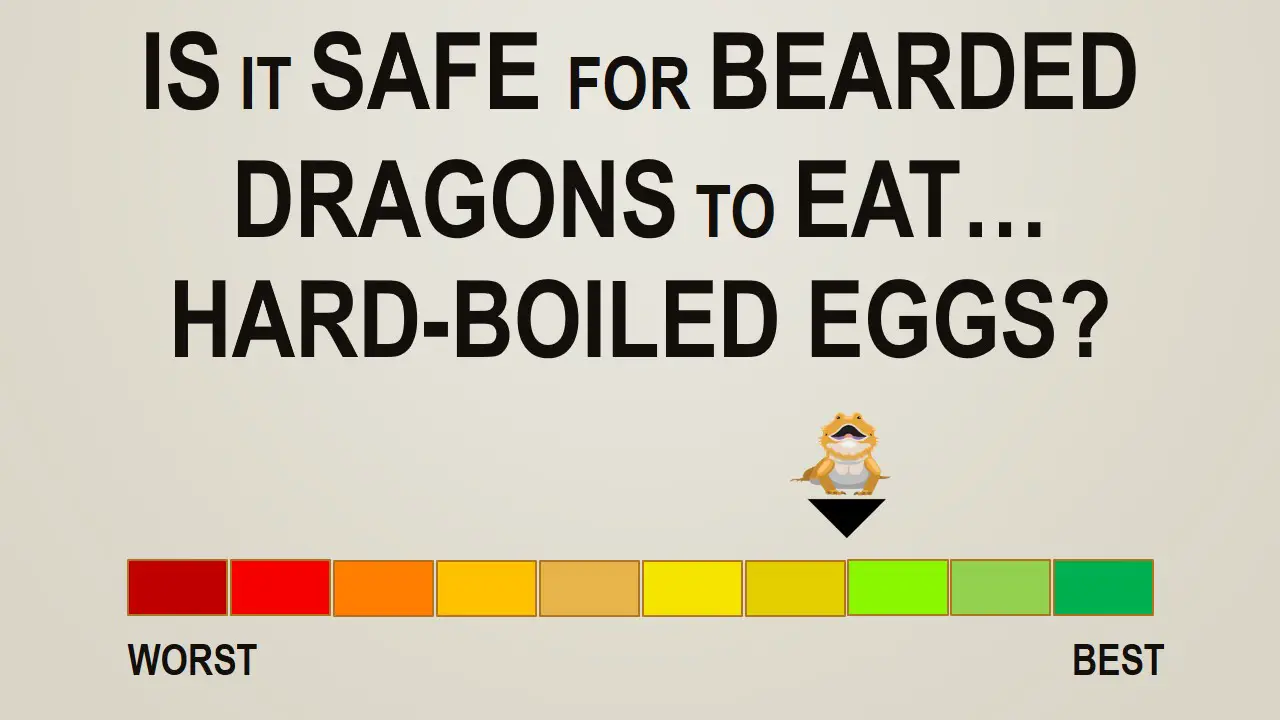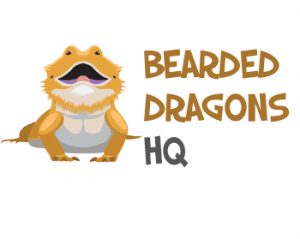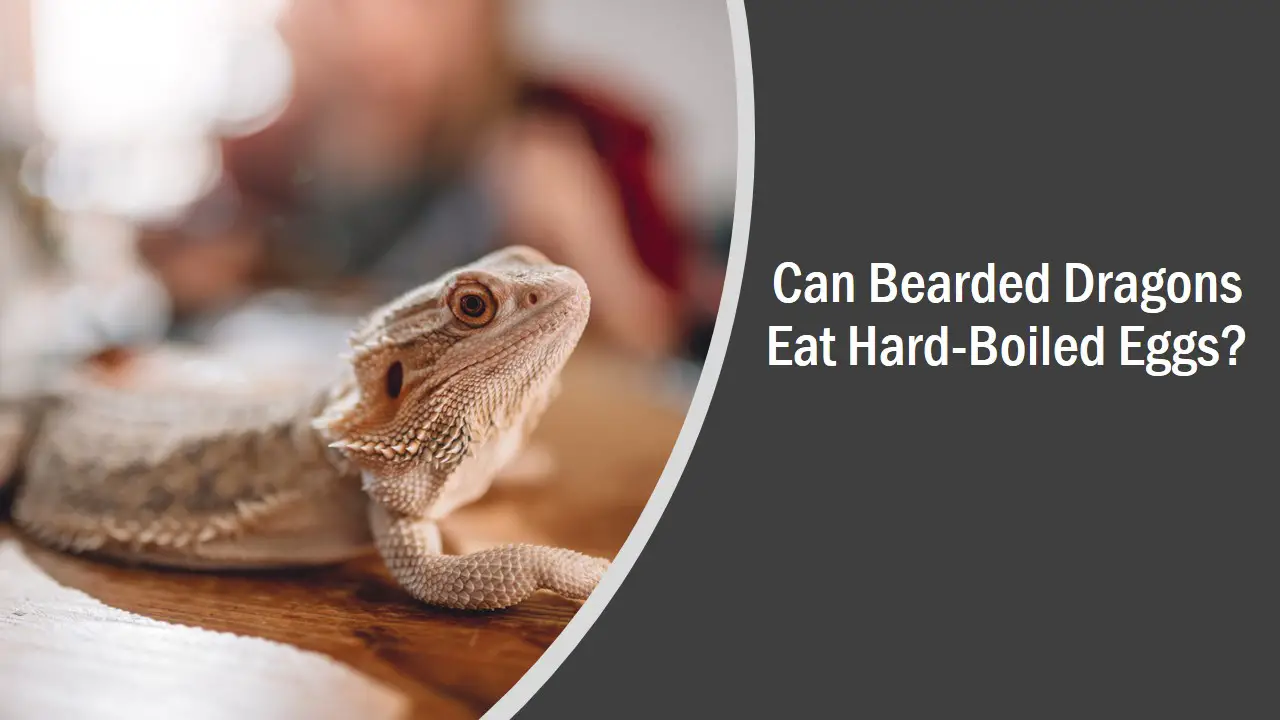Yes, Bearded Dragons can eat hard-boiled eggs. They are omnivorous and they will gladly welcome a healthy meal of cooked eggs in their diet.
Whether it’s boiled, baked, fried or deviled doesn’t matter; the eggs must be thoroughly cooked through to avoid any foodborne illness for your Bearded Dragon.
As convenient as that is, many people might think of feeding their beardies with raw eggs since that is what they do outdoors in nature: hunt and consume prey like insects and small lizards which haven’t been exposed to heat yet when they were captured by the wild bearded dragons. If you’re thinking about replicating this behavior in captivity, stop right there. This behavior is instinctive but not necessarily advisable. In fact, you risk exposing your pet to all kinds of bacteria and parasites that it might not be prepared to handle.
Also, cooking the eggs makes them much easier to digest.

What Are The Valuable Nutrients in Hard-Boiled Eggs?
Eggs are very nutritious. They contain a wide variety of vitamins and minerals, amino acids, and healthy fats.
One large hard-boiled egg contains:
- Vitamin A: 6% of the recommended daily intake (RDI)
- Vitamin B12: 25% of the RDI
- Omega 3 fatty acids: 19% of the RDI
- Calcium: 9% of the RDI
- Phosphorus: 9% of the RDI
Eggs without Yolk
- Omega 6 fatty acids
- Iron
- Choline
- Copper
- Zinc
- Selenium
- Magnesium
- Riboflavin
- Pantothenic acid
- Vitamin E
- Vitamin K
What Are The Benefits of Feeding My Bearded Dragon Hard-Boiled Eggs?
There are several benefits to feeding your Bearded Dragon eggs.
High in Protein: An average large hard-boiled egg contains 6 grams of protein, which is 12% of an adult bearded dragon’s recommended daily intake (RDI). Since they are omnivores, bearded dragons need a diet high in protein and low in fat.The proteins found in eggs contain all the amino acids essential for maintaining good health, building muscles, and repairing body tissues.
Amino Acids: All types of meat – not just insects – provide your bearded dragon with valuable amino acids that help boost its immune system function. Amino acids also support healthy digestion by breaking down food into usable nutrients that the body can then use to grow muscle mass.
Bearded Dragons love them: When you cook an egg for your beardie, it will take one sniff and then go crazy for it. The sight of a hard-boiled egg is enough to make a bearded dragon salivate. This means that they find the smell and taste appealing – which is a good thing because there’s no denying that cooked eggs are delicious. After all, why would a pet lizard want to eat anything else if it doesn’t like what you’re offering? It wouldn’t.
Eggs make great treats: Insects can be difficult to feed to your pet Bearded Dragon sometimes, but everyone knows how popular eggs are as tasty snacks.
Can Bearded Dragons Consume These Foods?
What Type of Eggs Can Be Fed to Reptiles?
Medium or large eggs are best suited for feeding reptiles like Bearded Dragons because they typically contain more protein than small eggs do (21 grams vs 13 grams).
Do not feed quail eggs; these are too small and usually don’t contain enough nutrients to make a significant contribution to your bearded dragon’s diet.
Boiled eggs are easier to digest than raw ones, which means that your bearded dragon will get more nutrition from them.
What Can Be Fed with The Eggs?
Since this article is about feeding Bearded Dragons hard-boiled eggs, you can be sure that anything you feed with these eggs must have been cooked thoroughly as well.
Having said that, there are many different foods you can feed together with hard-boiled eggs:
- Crickets or small grasshoppers: Cooked insects should always form part of a balanced meal for pet lizards because they are high in protein and fat.
- Waxworms: These are great snacks but shouldn’t be fed every day because some reptiles are allergic to them
- Roaches: All insects are loaded with protein, but roaches stand out because they are unusually high in fat. This means that feeding your bearded dragon only roaches aren’t recommended for obese lizards or those with health issues. Roaches aren’t poisonous, but it’s best to avoid feeding them if possible.
What Are The Risks of Feeding My Bearded Dragon Hard-Boiled Eggs?
There are no specific risks associated with feeding your Bearded Dragon eggs, although there is a chance that the food may cause them harm. This is because reptile specialists have yet to conduct proper research on how exactly they react to certain foods, especially those they never had before.
In general, it’s best to feed only two or three eggs per week as treats for healthy adult lizards. Monitor their behavior and do not hesitate to consult a veterinarian if you notice that something about these hard-boiled snacks seems off. Never start feeding your pet Bearded Dragons any type of food abruptly because this can lead to potentially dangerous health issues.
Can I Feed My Bearded Dragon Raw Eggs?
No.
Can Bearded Dragons Eat Hard-Boiled Eggs? – The Conclusion
Yes, bearded dragons can eat hard-boiled eggs.
They are high in protein and low in fat, which makes them an optimal snack for lizards that need to gain or maintain weight. Eggs also contain all the essential amino acids which means that eating them will help repair body tissues, boost your pet’s immune system function, and contribute to healthy digestion.
However, feed only two or three eggs per week as treats because too much of this food may have adverse effects on your pet’s health. Always keep a watchful eye on their behavior after eating cooked food items so you know when to consult a specialist vet if necessary.

